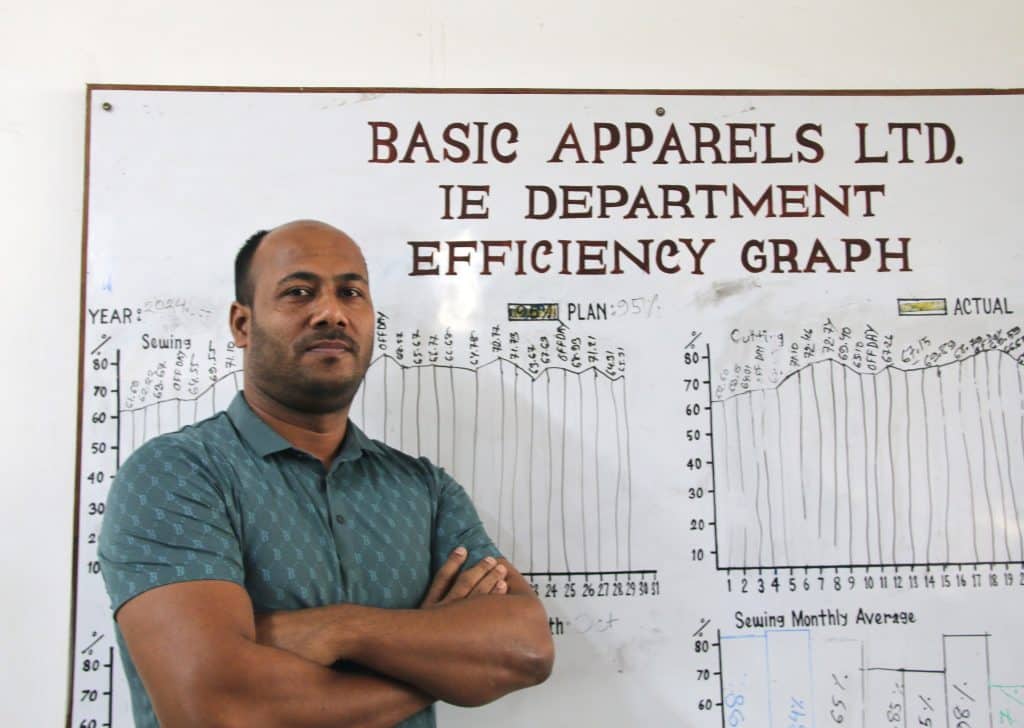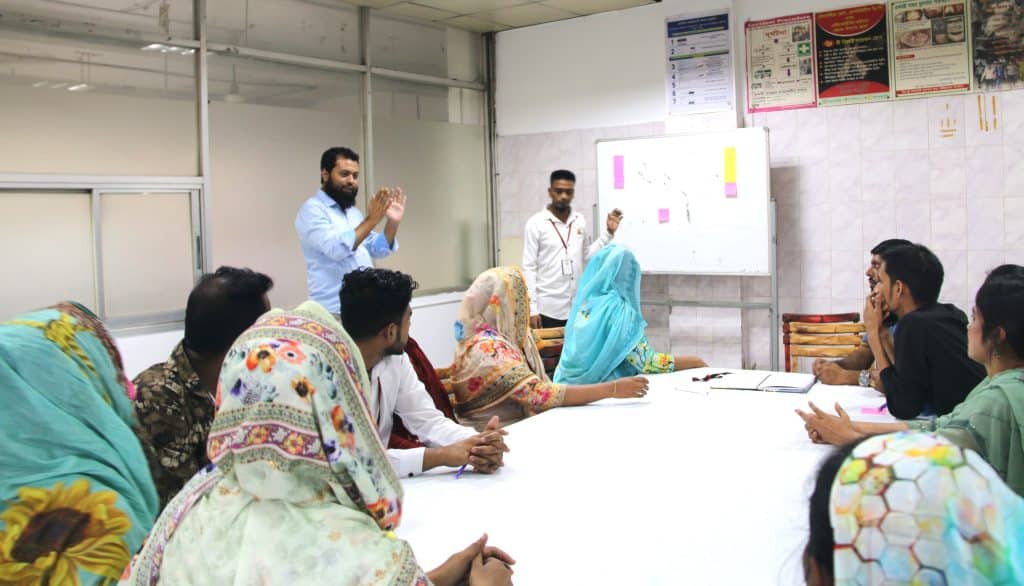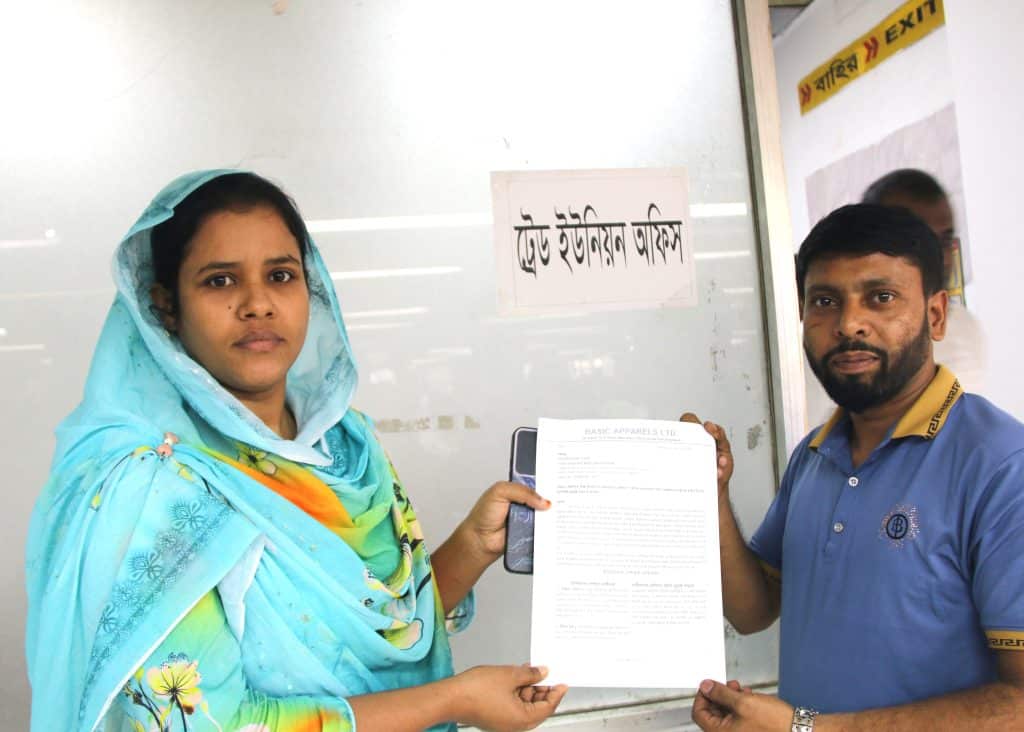ABDULLAHPUR, Bangladesh – “During the recent unrest, our factory didn’t halt for a single day. We talked to our trade union for days about their demands and implemented all of them,” Mohammad Rubel says with confidence.
Rubel is the Production Manager at Basic Apparels Ltd, a garment factory located in Abdullahpur on the outskirt of Bangladesh’s capital city, Dhaka. Set up in 1991, the factory produces workwear for German buyers and has an annual export turnover of US$ 32.5 million.
Bangladesh has been experiencing social and economic instability since well before the landmark change in government in August 2024. Dhaka and the surrounding area have been heavily affected. During the past months, labour protests have gripped the country’s garment industry, resulting in the reported death of one worker, while leaving numerous injured and several factories shut. Basic Apparels is one of the handful of factories which continued to operate despite disruptions in the industrial areas.
The management at Basic Apparels gives credit for this success to the dialogue between management and workers’ representatives. Rubel says, “I have previously worked in a garment factory which didn’t have a trade union. There, we didn’t have any scope to identify and address the problems of workers. The presence of a trained, well-functioning union helps us to recognize and resolve problems at the root level.”

The trade union at Basic Apparels comprises 1,300 general members with an executive committee of eight women and five men representatives. As a decentralization effort, the union has formed sub-committees at every production line of the factory. The sub-committee members inform the union representatives about problems as they arise. The union then brings these issues to the attention of line supervisors and section-in-charges, so they can take action. The problems that are not resolved at the floor-level are discussed at the meeting between the trade union and senior management held every two months. This structure has proved effective at Basic Apparels, as reported not only by the management but the unions.
28-year-old Mosammat Shahinur is a sewing operator and the secretary of the trade union at Basic Apparels. She says, “We plan to make more workers aware of their fair and due rights.”
‘A guide for solutions’
Basic Apparels Ltd. is in the second year of its partnership with the ILO-IFC’s Better Work Bangladesh (BWB) programme, which offers assessment, advisory and capacity building support to partner factories.
Manager of Human Resource and Compliance at Basic Apparels, Mohammad Zubaer Hossain, sees Better Work services as `a guide for solutions’. He says, “Our partnership with Better Work helped us to understand the problems in our factory and identify the steps towards a solution.”

During the period of unrest in Bangladesh, significant disruptions occurred in factory operations, export activities and the broader supply chain. The situation highlighted the need for proactive measures, including robust social dialogue and adherence to worker rights to minimize the impact of such crises in the future. Throughout the unrest, Better Work Bangladesh maintained communication with its partner enterprises where possible.
Better Work Bangladesh staff addressed queries from factories regarding workers’ payments during curfews and general holidays, including payments for non-production workers like security guards who remained on duty. The programme has also encouraged factories to engage in social dialogue to prevent future conflicts and supported communication efforts for prompt wage disbursement and addressing of worker grievances.
Capacity building support from Better Work Bangladesh
33-year-old Mohammad Dulal has been working at Basic Apparels since 2011 as a sewing operator and is the president of the factory’s trade union. Dulal attended trainings on labour law, collective bargaining and sexual harassment organized by Better Work.
“Before, we didn’t know what we can ask according to the law and whom we can approach with our demands,” says Dulal. “We have now learned the difference between rights of a worker and demands of a worker. We learned that we must approach our in-charge or supervisor first when a problem arises. We have developed the skill to resolve problems through dialogue.”

Production manager Rubel also took part in Better Work’s leadership training, following which he trained the line supervisors to resolve workers’ issues with more urgency. He said supervisors are now empowered to issue gate passes to workers who wish to take short breaks to attend personal matters. Previously, these issues used to linger and create discontent among workers who needed urgent solutions.
A caring, skilled and productive family
To further facilitate the dialogue mechanism, a change management committee (CMT) also exists at Basic Apparels. The CMT includes mid-level management staff as its members who aim to bridge the gap between workers and senior management.
HR manager Zubaer has trained the trade union representatives, CMT members and general workers on labour law and workers’ welfare. He says, “Our goal was to form a ‘basic family’ where everyone would look after each another. As a result, our turnover of skilled workers is very low.”
Rubel adds, “The union members can communicate better with the workers as their representatives. If I recognize that a worker is not performing to his or her capacity, I seek the union’s help to counsel the particular worker. This support from the trade union contributes to our productivity.”
Letitia Weibel Roberts, Deputy Programme Manager of Better Work Bangladesh, says: “Through shared effort and commitment, we are optimistic that peaceful and productive industrial relations can be achieved and maintained, benefiting all parties involved.”